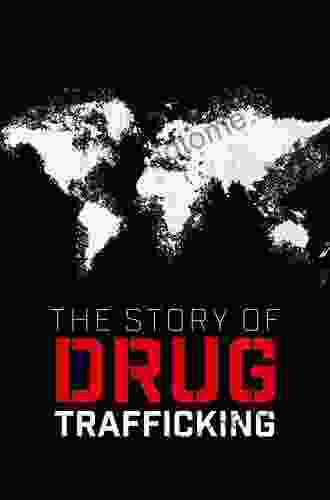History, Science, and Issues: The Story of Drugs

5 out of 5
| Language | : | English |
| File size | : | 2424 KB |
| Text-to-Speech | : | Enabled |
| Screen Reader | : | Supported |
| Enhanced typesetting | : | Enabled |
| Print length | : | 259 pages |
Drugs have been a part of human history for centuries. From the earliest civilizations to the present day, people have used drugs for a variety of purposes, including medicinal, recreational, and spiritual.
The history of drugs is a complex and fascinating one. It is a story of discovery, innovation, and abuse. It is also a story of how drugs have shaped our societies and cultures.
The science of drugs is equally complex. Drugs can have a wide range of effects on the human body and mind. Some drugs can be beneficial, while others can be harmful. Understanding the science of drugs is essential for making informed decisions about their use.
The social issues surrounding drug use are also complex. Drug use can have a negative impact on individuals, families, and communities. It can lead to addiction, crime, and violence. Drug use can also strain our healthcare system and our economy.
The story of drugs is a complex and multifaceted one. It is a story that is still being written. As we learn more about drugs, we can better understand their risks and benefits. We can also develop more effective strategies for preventing and treating drug abuse.
The History of Drugs
The earliest evidence of drug use dates back to the Stone Age. Archaeologists have found evidence that people were using opium poppies and cannabis as early as 10,000 BC.
In ancient Egypt, drugs were used for medicinal and religious purposes. The Ebers Papyrus, which dates back to 1550 BC, contains over 800 prescriptions for drugs. The ancient Egyptians used drugs to treat a variety of ailments, including headaches, stomach aches, and infections.
In ancient Greece, drugs were also used for medicinal and religious purposes. Hippocrates, the father of Western medicine, wrote about the use of drugs in his medical texts. The ancient Greeks used drugs to treat a variety of ailments, including epilepsy, depression, and pain.
In ancient Rome, drugs were used for a variety of purposes, including medicinal, recreational, and religious. The Romans were particularly fond of opium, which they used to relieve pain and anxiety.
In the Middle Ages, drugs were used for a variety of purposes, including medicinal, recreational, and religious. The Arabs were particularly interested in alchemy, and they developed a number of new drugs, including alcohol and mercury.
In the Renaissance, drugs were used for a variety of purposes, including medicinal, recreational, and scientific. The Renaissance was a time of great discovery and innovation, and new drugs were being developed all the time.
In the 19th century, drugs were used for a variety of purposes, including medicinal, recreational, and scientific. The 19th century was a time of great industrialization, and new drugs were being developed to treat the diseases that were common in the industrial age.
In the 20th century, drugs were used for a variety of purposes, including medicinal, recreational, and scientific. The 20th century was a time of great social and political change, and drug use reflected the changing times.
The Science of Drugs
Drugs can have a wide range of effects on the human body and mind. Some drugs can be beneficial, while others can be harmful.
The effects of a drug depend on a number of factors, including the type of drug, the dose, the route of administration, and the individual's physiology.
Drugs can be classified into a number of different categories, including:
- Stimulants: Stimulants increase alertness, energy, and focus. Examples of stimulants include caffeine, nicotine, and cocaine.
- Depressants: Depressants slow down the central nervous system. Examples of depressants include alcohol, barbiturates, and opioids.
- Hallucinogens: Hallucinogens alter perception and mood. Examples of hallucinogens include LSD, psilocybin, and mescaline.
- Cannabinoids: Cannabinoids affect the endocannabinoid system, which is involved in a variety of physiological processes, including appetite, pain, and mood. Examples of cannabinoids include marijuana and hashish.
The effects of drugs can be both short-term and long-term. Short-term effects can include changes in mood, behavior, and physical functioning. Long-term effects can include addiction, organ damage, and mental health problems.
It is important to understand the science of drugs before using them. This will help you to make informed decisions about their use and to avoid potential risks.
The Social Issues Surrounding Drug Use
Drug use can have a negative impact on individuals, families, and communities. It can lead to addiction, crime, and violence. Drug use can also strain our healthcare system and our economy.
Addiction is a chronic disease that is characterized by compulsive drug use despite negative consequences. Addiction can lead to a variety of problems, including health problems, job loss, and relationship problems.
Crime is another major social issue that is associated with drug use. Drug use can lead to crime in a number of ways. For example, people who are under the influence of drugs may be more likely to commit crimes of violence or property crimes. Drug use can also lead to crime by creating a market for illegal drugs.
Violence is another major social issue that is associated with drug use. Drug use can lead to violence in a number of ways. For example, people who are under the influence of drugs may be more likely to be involved in fights or other violent incidents. Drug use can also lead to violence by creating a market for illegal drugs.
Drug use can also strain our healthcare system and our economy. Drug use can lead to a number of health problems, including addiction, overdose, and organ damage. These health problems can strain our healthcare system and lead to increased healthcare costs.
Drug use can also strain our economy. Drug use can lead to job loss, decreased productivity, and increased crime. These factors can all lead to a decrease in economic output.
The social issues surrounding drug use are complex and multifaceted. There is no easy solution to these problems. However, we can take steps to reduce the negative consequences of drug use by increasing prevention efforts, providing treatment for addiction, and reducing the demand for illegal drugs.
The story of drugs is a complex and multifaceted one. It is a story that is still being written. As we learn more about drugs, we can better understand their risks and benefits. We can also develop more effective strategies for preventing and treating drug abuse.
The social issues surrounding drug use are also complex and multifaceted. There is no easy solution to these problems. However, we can take steps to reduce the negative consequences of drug use by increasing prevention efforts, providing treatment for addiction, and reducing the demand for illegal drugs.
By working together, we can create a society where drug use is no longer a major problem.
5 out of 5
| Language | : | English |
| File size | : | 2424 KB |
| Text-to-Speech | : | Enabled |
| Screen Reader | : | Supported |
| Enhanced typesetting | : | Enabled |
| Print length | : | 259 pages |
Do you want to contribute by writing guest posts on this blog?
Please contact us and send us a resume of previous articles that you have written.
 Book
Book Novel
Novel Page
Page Chapter
Chapter Text
Text Story
Story Genre
Genre Reader
Reader Library
Library Paperback
Paperback E-book
E-book Magazine
Magazine Newspaper
Newspaper Paragraph
Paragraph Sentence
Sentence Bookmark
Bookmark Shelf
Shelf Glossary
Glossary Bibliography
Bibliography Foreword
Foreword Preface
Preface Synopsis
Synopsis Annotation
Annotation Footnote
Footnote Manuscript
Manuscript Scroll
Scroll Codex
Codex Tome
Tome Bestseller
Bestseller Classics
Classics Library card
Library card Narrative
Narrative Biography
Biography Autobiography
Autobiography Memoir
Memoir Reference
Reference Encyclopedia
Encyclopedia Robert Mayer
Robert Mayer Stephan Beissel
Stephan Beissel Nurse Academy
Nurse Academy Steven C Brisson
Steven C Brisson Nora Davies
Nora Davies Sasha Brown Worsham
Sasha Brown Worsham Perry Martin
Perry Martin Pendred Noyce
Pendred Noyce Paul M Mather
Paul M Mather Ruth Singer
Ruth Singer Nick Flynn
Nick Flynn Peter Hawkins
Peter Hawkins Paul Garvin
Paul Garvin Paul Sanghera
Paul Sanghera Tahir Abbas
Tahir Abbas Thomas Seebeck
Thomas Seebeck Zachary A Smith
Zachary A Smith Jon Hershfield Mft
Jon Hershfield Mft Swami Anubhavananda
Swami Anubhavananda Patricia A Deuster
Patricia A Deuster
Light bulbAdvertise smarter! Our strategic ad space ensures maximum exposure. Reserve your spot today!
 Duncan CoxFollow ·9.8k
Duncan CoxFollow ·9.8k Cody BlairFollow ·3.5k
Cody BlairFollow ·3.5k Glen PowellFollow ·12k
Glen PowellFollow ·12k Fabian MitchellFollow ·4.5k
Fabian MitchellFollow ·4.5k Victor TurnerFollow ·19.4k
Victor TurnerFollow ·19.4k Samuel WardFollow ·2.7k
Samuel WardFollow ·2.7k Jorge AmadoFollow ·8.5k
Jorge AmadoFollow ·8.5k Andres CarterFollow ·19.1k
Andres CarterFollow ·19.1k

 W. Somerset Maugham
W. Somerset MaughamNourishing Delights: Easy Recipes Without Salt, Oil, or...
Are you looking for...

 Zachary Cox
Zachary CoxThe Art of Kitchen Fitting: A Masterful Guide to Culinary...
The kitchen, the heart of...

 Elliott Carter
Elliott CarterArticulating the Spirit of Black Women Teacher Leaders:...
In the tapestry of education,...

 James Gray
James GrayThe Complete Guide to Arduino: Your Journey to...
: Unveiling the...
5 out of 5
| Language | : | English |
| File size | : | 2424 KB |
| Text-to-Speech | : | Enabled |
| Screen Reader | : | Supported |
| Enhanced typesetting | : | Enabled |
| Print length | : | 259 pages |
















